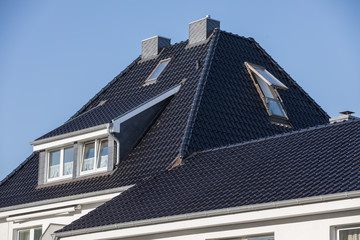Chimney relining is a process that protects the inside of your chimney and home vent system from damage. It helps repair gaps and cracks and seal creosote buildup. It is also a great way to improve the efficiency of your fireplace. Chimney relining should be done by a licensed professional to ensure the best results. This process is ideal for older, damaged, or weak chimneys.
 A properly functioning chimney must contain combustion products and vent them outside safely. A poorly functioning chimney can pose a danger to you and your family, so it is vital to have it checked out by a qualified professional. If your flue liner is old or in poor condition, it is important to have it replaced. There are several options for relining your chimney, depending on the size of your existing liner and the overall condition of your flue.
A properly functioning chimney must contain combustion products and vent them outside safely. A poorly functioning chimney can pose a danger to you and your family, so it is vital to have it checked out by a qualified professional. If your flue liner is old or in poor condition, it is important to have it replaced. There are several options for relining your chimney, depending on the size of your existing liner and the overall condition of your flue.
Chimney relining involves installing a new liner into the chimney, which is typically made of flexible or rigid stainless steel. This liner prevents smoke from leaking out of the exterior walls of your home, and it is easier to maintain. Chimney relining also ensures that you’ll be able to keep your fireplace running safely.
Chimney liners are designed to last for many years, but over time, they can break or erode. Damaged liners can also result in leaks of carbon monoxide, which is dangerous for you and your family. Because of this, it’s essential to have your chimney relined as soon as possible. The relining process is a quick, simple, cost-effective alternative to rebuilding your entire chimney.
Chimney relining is a great way to upgrade the efficiency of your home’s fireplace and prevent future fires. It replaces an older masonry chimney with a modern metal one, which is less expensive than masonry work. In addition, a new liner is much more durable and can last for many years.
Getting your chimney relined is an important part of maintaining your home, and you should consider a chimney inspection before investing in new appliances or a fireplace. An inspection can determine if the entire chimney structure is still functional. In addition, experts use CCTV to inspect for internal damages, which helps them diagnose the cause of your chimney’s deterioration.
Chimney liners can be installed quickly to restore your chimney’s efficiency. There are two main types of stainless steel chimney liners. They are durable, easy to install, and come in a variety of sizes. Stainless steel liners are popular and come with lifetime warranties. They prevent leakage, and prevent carbon monoxide from reaching your home. Chimney liners can also prevent dangerous toxins from entering your home’s structure.
Ceramic/cement liners are another popular choice for relining your chimney. These liners are highly durable and can withstand the extreme heat, condensation, and corrosive byproducts of combustion. They cost about $250 per square foot and can last up to 50 years. A qualified technician can install them in as little as one day.
A new chimney liner can help extend the life of an old chimney by containing the dangerous creosote buildup. The lining can also protect bricks and mortar of your chimney. In addition to protecting your home structure from damage, it can prevent dangerous fires from spreading throughout the home.
Before you decide on a chimney relining service, you should first consult with a professional to ensure the safety of your family and home. Using a professional can help you avoid costly repairs and leaks. It’s also recommended to check the insulation level of your chimney before lining. By getting several quotes, you’ll be able to choose an affordable option.
Changing the flashing on a chimney is a major repair project. You’ll need to replace the flashing on a chimney if you’re experiencing leaking. This is a challenging task, requiring experience and skill. A ladder and sturdy steps will be necessary, and you should hire a professional to help you complete this project. Always make sure to get the right tools and materials for the job. Accurate measurements are necessary when cutting the flashing. If you climb onto a roof, make sure you wear a helmet and protective eyewear.

